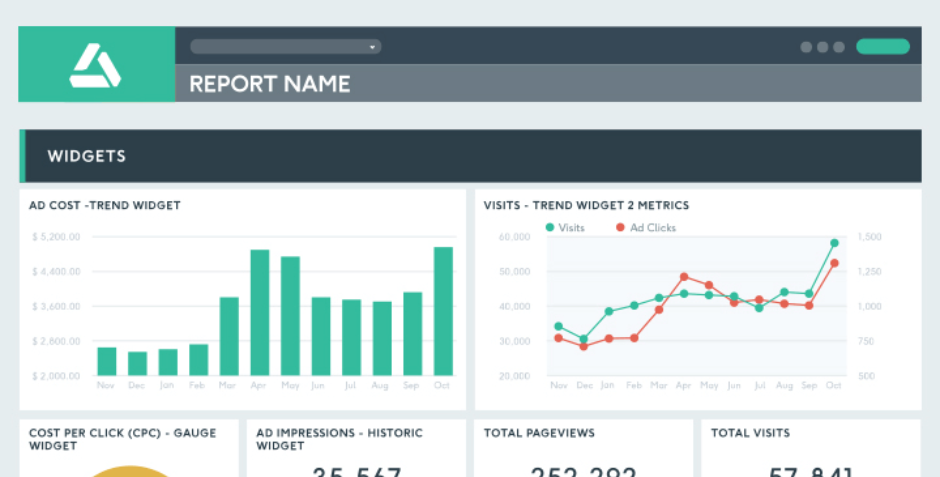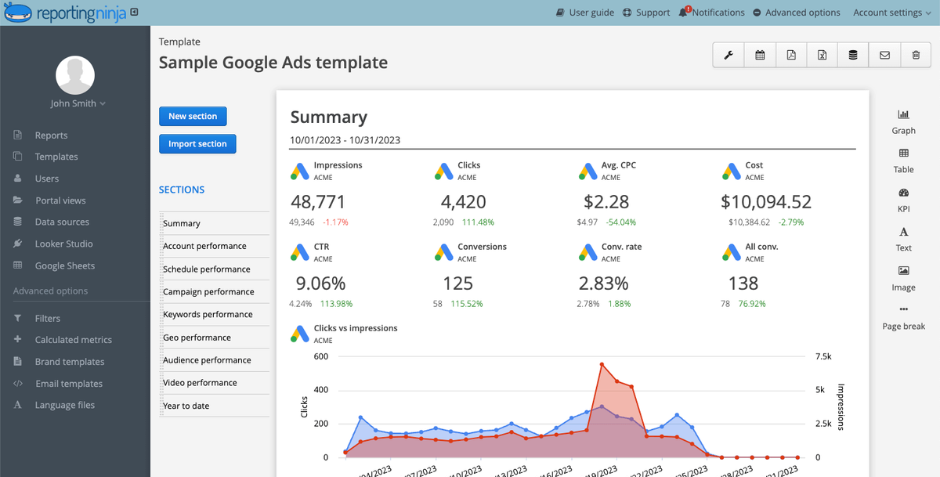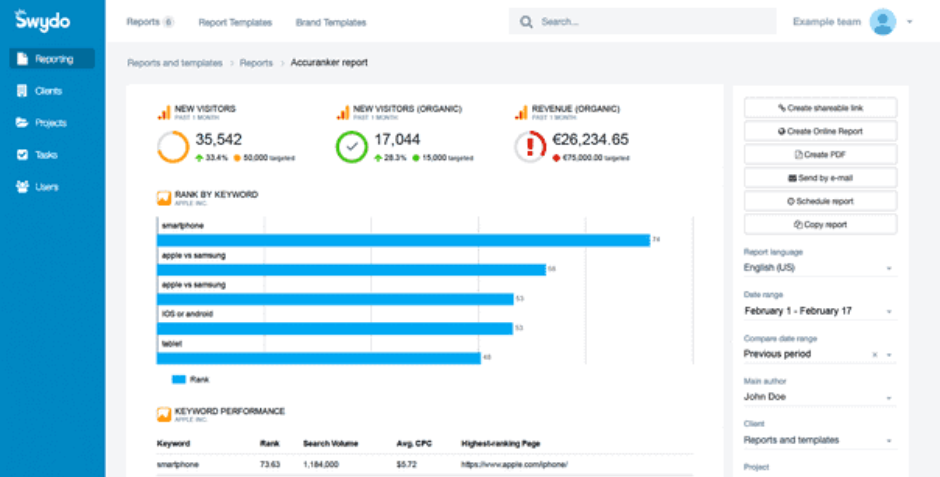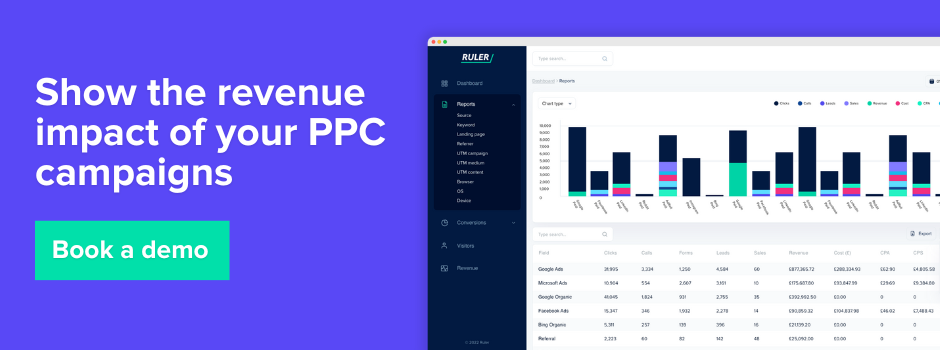Looking for the best PPC tools? We walk you through our top choices and the value they can add to your advertising campaigns.
PPC advertising reigns supreme as a method to generate brand awareness and acquire new customers.
In fact, a staggering $190.5 billion is expected to be spent on search advertising globally throughout 2024. This surge in investment reflects the immense power of PPC, but with great power comes great responsibility.
As marketing budgets tighten and expectations increase, demonstrating a return on investment is no longer optional.
Leaders are eager to see not only how your PPC campaigns are generating leads and sales, but also how you plan to optimise them for continued growth.
But without the right data and insights, effectively communicating the impact of your campaigns and maximising ROI becomes an uphill battle.
To help you navigate these challenges and unlock the full potential of your PPC efforts, we’ve compiled a shortlist of the top tools you need to consider in 2024.
Not only will these tools help you demonstrate the value of your PPC campaigns, but will also propel your ROI to new heights.
💡 Pro Tip
Unlock the ROI of your PPC with Ruler. It tracks every touchpoint, reveals true customer journeys, and connects closed revenue to your campaigns. It also explores the hidden impact of impressions, attributing conversions (such as purchases or leads) and revenue back to ads that users viewed but didn’t click, shifting credit from bottom-of-the-funnel efforts to ads at the top of your funnel.
Skip to learn more about Ruler, or book a demo to see how it can help evidence the ROI of your PPC campaigns and improve your optimisation.
Imagine juggling multiple advertising platforms like Google Ads, Microsoft Ads, and Facebook Ads.
Each platform throws data at you: clicks, impressions, conversions, costs. Manually compiling this information and transforming it into actionable insights can be a nightmarish chore.
PPC reporting tools act as automated data aggregators, pulling information from various
platforms into a single, unified report. But it’s not just about data collection. These tools also allow you to:
PPC reporting tools can help you optimise your ads, reduce wasted spend and streamline your targeting.
After all, PPC isn’t easy. And there are certain roadblocks in the way when it comes to reporting on your PPC campaigns in particular.
First, not every user is going to land on your website after clicking an ad and convert right away.
Imagine if they did! Sadly, each user has to go through their own customer journey from awareness to consideration to the decision stage.
Related: Learn more about tracking customer journeys and touchpoints
With PPC, you don’t know where each user is within their own customer journey. Your ad might be working to drive awareness of your brand and product. Or, it could be helping to drive the decision stage.
Of course, your targeting should be set up in a way so that ads can be specified to hit the right people at the right time. But each stage of the buyer’s journey can be made up of multiple touchpoints.
According to Think with Google, customer journeys are getting longer and longer. For those interested in purchasing a flight, they could have over 500 touchpoints before converting.
So, with all this data in play, and all of these touchpoints to consider, how can you attribute a closed sale back to a PPC ad that formed one small part of one very long journey? And, even more importantly, how can you determine that ad played a significant role?
That leads us nicely to point two.
When you’re setting up a PPC campaign, your goals will differ depending on your business type and your industry.
For example, if you work in eCommerce, you can work to drive direct sales (though you’ll still have the issue of attribution if customers have long journeys).
However, for many marketers using PPC, you’re more likely to drive leads and offline conversions.
When we say leads, we mean people who contact you via form fill, live chat or call. As far as offline conversions go, they’re hard to track.
Well, let’s use an example.
First, let’s imagine you have no tracking set up. How are you reporting on the performance of your campaigns?
Secondly, let’s imagine you have lead tracking set up so you can count when new leads come in.
How do you know new leads are a result of your PPC campaigns?
Thirdly, you might have lead tracking set up and you might have tracking set up to be able to attribute leads back to the source.
But, a lead isn’t revenue.
So while you’re proudly highlighting how many leads your campaigns generated, what can you say about revenue?
When you’ve got leads and offline conversions to deal with, very little without proper tracking tools.
Now you know why you might need a PPC reporting tool in your marketing stack, let’s go through some of our favourites.
Remember, not all of these are essential. But the tools we’ve listed below could help you take your paid advertising to the next level.
Let’s see which PPC reporting tools made the cut.
Table of Contents
Ruler is a marketing attribution tool that sheds light on the entire customer journey. It tracks website visitors across visits, pinpointing how they found you and what content piqued their interest (keywords, landing pages).
When a visitor becomes a lead, Ruler seamlessly connects their details to their browsing history, revealing the exact path they took to convert. This valuable data is then sent directly to your CRM, making it readily accessible to your sales team.
But Ruler’s power goes beyond simple lead tracking. It also ties closed revenue back to your ad creatives, keywords, and landing pages, allowing you to calculate your return on ad spend (ROAS) with unmatched confidence.
Unlike traditional ad platforms with limited attribution windows, Ruler isn’t confined by short timeframes or last-touch models. It excels at tracking conversions over longer, intricate B2B sales cycles, ensuring your PPC campaigns get the credit they deserve.
Ruler even offers impression attribution, a game-changer for understanding the unseen influence of ad impressions. It attributes conversions (like purchases or leads) and revenue to users who saw your ad but didn’t click. This shifts credit away from bottom-funnel efforts and highlights the value of top-funnel ad exposure in nurturing leads.
Ruler Analytics offers flexible 12-month agreements with pay monthly or annually options. While pricing varies based on factors like monthly traffic volume and specific needs, it starts from £199 per month.
AgencyAnalytics is a comprehensive SEO, PPC, and social media analytics dashboard and reporting platform designed specifically for marketing agencies.
It boasts a robust suite of 16 different PPC integrations, encompassing industry giants like Google Ads, Amazon Ads, Facebook Ads, and more. This eliminates the need to painstakingly pull data from individual platforms, saving you valuable time and resources.
Both automated reporting and customisable PPC dashboards offer a range of user-friendly white-labelling options, allowing you to seamlessly present reports that reflect your agency’s branding, while fostering a professional and cohesive experience for your clients.
One particularly valuable feature for agencies is the built-in PPC markup.
You can choose to specify your agency markup at the campaign level for granular control, or apply it automatically across all campaigns for streamlined management. This innovative tool ensures clear communication of costs and overheads with your clients, eliminating confusion and building trust.
AgencyAnalytics offers a risk-free 14-day trial, no credit card required. Their pricing plans cater to different needs, with options starting at just $12 per month for freelancers and $18 per month for agencies. They also offer a custom plan for agencies with extensive needs.
DashThis boasts a powerful integration engine, seamlessly connecting with over 40 different platforms.
This eliminates the need to manually collect data from each source, saving you hours and allowing you to focus on what matters most – analysing the data and optimising campaigns.
With all your PPC data consolidated in one place, DashThis automatically generates beautiful reports that provide a clear picture of your campaign performance.
Going beyond basic reporting, DashThis empowers you to create custom dashboards tailored to your specific needs and client preferences.

Choose from a wide range of widgets to visualise every crucial PPC metric you track, from impressions and clicks to conversions and return on ad spend.
You can even add your logo and personalise the reports with comments and notes, offering context and explaining the “why” behind the numbers.
DashThis offers a variety of pricing plans to fit your agency’s needs, ranging from the Individual plan at $42 per month to the Standard plan at $382 per month. With a 14-day free trial available, you can experience the power of effortless PPC reporting firsthand and see how DashThis can revolutionise your client communication strategy.
Let’s face it, Google Analytics 4 is a staple in the performance marketer’s toolkit. Our own research indicates a whopping 90% of marketers leverage Google Analytics to gauge their campaign effectiveness – and for good reason.
GA4, the latest iteration of this industry titan, offers a robust feature set designed to empower your marketing efforts.
Businesses can utilise GA4 to monitor conversion rates across various ad sources, providing a clear understanding of which channels are delivering the most value.
One of its most compelling features is the machine learning-powered audience builder. This innovative tool allows you to construct highly targeted audience segments based on a rich set of criteria, including demographics, interests, and user behaviour on your website.
These meticulously crafted segments can then be seamlessly integrated with Google Ads for remarketing campaigns, ensuring your PPC efforts reach the most relevant users at the right time.
Furthermore, GA4’s integration with Google Ads, both being part of the Google Marketing Platform, fosters a holistic view of your marketing funnel. You can gain a deeper understanding of how users navigate from Google Ads to your website, and analyse their behaviour post-conversion.
Whether you’re a seasoned performance marketer or just starting out, GA4 is an essential tool to add to your arsenal.
Reporting Ninja seamlessly integrates with major advertising platforms like Google Ads and Bing Ads, consolidating your PPC data into a single, unified view.
Gone are the days of labouring over report creation. Reporting Ninja offers a library of pre-built templates specifically designed for different data sources, along with a treasure trove of customisable widgets. This drag-and-drop functionality allows you to construct professional reports in record time, saving you valuable hours that can be better spent on optimising campaigns.

Through clear and easy-to-understand graphs, Reporting Ninja helps you visualise complex data such as Return on Investment (ROI) and Return on Ad Spend (ROAS), simplifying data comprehension for both you and your clients and ensuring everyone is on the same page.
Reporting Ninja caters to agencies and businesses of all sizes, offering a variety of affordable pricing tiers. Plans start at just $20 per month for the Starter package, making it an accessible option for even the most budget-conscious teams. Reporting Ninja also boasts a generous 15-day free trial, allowing you to experience the platform’s capabilities firsthand before committing to a paid plan.
One of Octoboard’s biggest strengths is its library of over 350 pre-built templates specifically designed for PPC campaigns.
These templates eliminate the need to start from scratch, ensuring you’re tracking the most crucial metrics right out of the box, saving you valuable time you can dedicate to campaign optimisation and analysis.
But Octoboard doesn’t limit you to pre-built options. You can easily modify existing templates or create entirely custom dashboards and reports tailored to your specific needs. This flexibility empowers you to focus on the key performance indicators (KPIs) that matter most to your unique campaigns and goals.
Furthermore, Octoboard integrates seamlessly with all your major PPC channels, including Google Ads, Microsoft Ads, and social media advertising platforms. This consolidated view of your data allows you to effortlessly track and analyse performance across all your campaigns in one central location.
Octoboard caters to businesses of all sizes, offering a free plan to get you started. Paid plans begin at a budget-friendly €15 per month, with options specifically designed for marketing analytics, PPC data analysis, and even ecommerce analytics.
The pricing scales based on the features you need, such as the number of data sources you connect, website visits you track, and email orders you receive, ensuring you only pay for the functionalities that are relevant to your specific requirements.
The reality of modern PPC marketing is the multi-platform landscape. Fortunately, Optmyzr eliminates the headache of juggling data from disparate sources. It offers seamless cross-platform reporting, consolidating data from Google Ads, Microsoft Ads, Meta Ads, Amazon Ads, LinkedIn Ads, and even Google Analytics into a single, unified report.
Optmyzr prioritises efficiency by automating report generation and scheduling, so you can free yourself from manual updates and repetitive tasks.

Reports can be configured to refresh automatically with the latest data, ensuring you always have access to the most current insights.
Additionally, integrations with platforms like Slack and Zapier create opportunities to further streamline your workflow and automate report distribution.
Optmyzr offers a risk-free 14-day trial, allowing you to experience the platform’s capabilities firsthand. While pricing varies based on your advertising spend, plans start at a cost-effective $208 per month. For larger agencies or businesses with significant advertising budgets exceeding $500,000 per month, Optmyzr also provides custom plans tailored to specific needs.
Semrush’s competitive intelligence features allow you to analyse your competitor’s PPC campaigns, revealing their keyword strategies, ad copy, landing pages, and even estimated budget. This intel is a goldmine for performance marketers.
By understanding your competitor’s approach, you can identify opportunities to outrank them on key terms, craft more compelling ad copy, and develop high-converting landing pages that steal the spotlight.
Semrush empowers you to translate data into actionable insights through its “My Reports” feature. You can build custom reports tailored to your specific needs and stakeholder preferences. Choose from a comprehensive range of data points to include, and customise the layout for optimal readability.
More importantly, Semrush analyses your data and provides actionable recommendations to elevate your PPC strategy. These insights can encompass suggestions for optimising bids, crafting more persuasive ad copy, and targeting high-value keywords that drive conversions.
Semrush caters to businesses of all sizes, offering tiered pricing plans to fit your specific needs. The Pro plan starts at a budget-friendly $129.95 per month, while the Guru plan unlocks additional features for $249.95 per month.
For larger agencies or businesses requiring extensive functionalities, the Business plan starts at $499.95 per month. There’s also an Enterprise solution with custom pricing designed for very large organisations.
Swydo’s claim to fame lies in its dynamic templates. Imagine creating a single template that outlines the key PPC metrics you track for all your clients.
With a few clicks, you can update hundreds of reports at once by simply making a change to this master template. This eliminates the need to manually update each report, freeing up valuable time you can dedicate to analysis and strategy—a game-changer for agencies managing a large portfolio of PPC accounts.

While templates provide a fantastic starting point, Swydo also offers deep customisation options.
You can tailor the pre-built templates or build your own from scratch, allowing you to include specific metrics and widgets that resonate most with your client’s unique goals.
Swydo’s pricing is designed to scale with your needs. Their base plan starts at a budget-friendly $49 per month and includes all features, unlimited users, reports, dashboards, and access to 10 data sources.
If you need more data sources, Swydo offers a flexible pricing structure that adds them based on a sliding scale, so you only pay for what you use.
Using PPC reporting tools can help businesses, and particularly agencies, keep track of their efforts and ensure they’re staying optimised to get the best results. But remember, while a lot of these reporting tools help you create and schedule reports easier, they don’t give you the full picture.
Ruler Analytics is the only tool listed that allows you to track leads through the full customer journey. Whether leads come through via call, form and live chat, you can ensure complete visibility of how many leads you’re generating and how much revenue you’re driving too.
Want to try Ruler for yourself? Book a demo with our team and discover the core elements of Ruler’s functionality and what it does to track leads from start to end.
